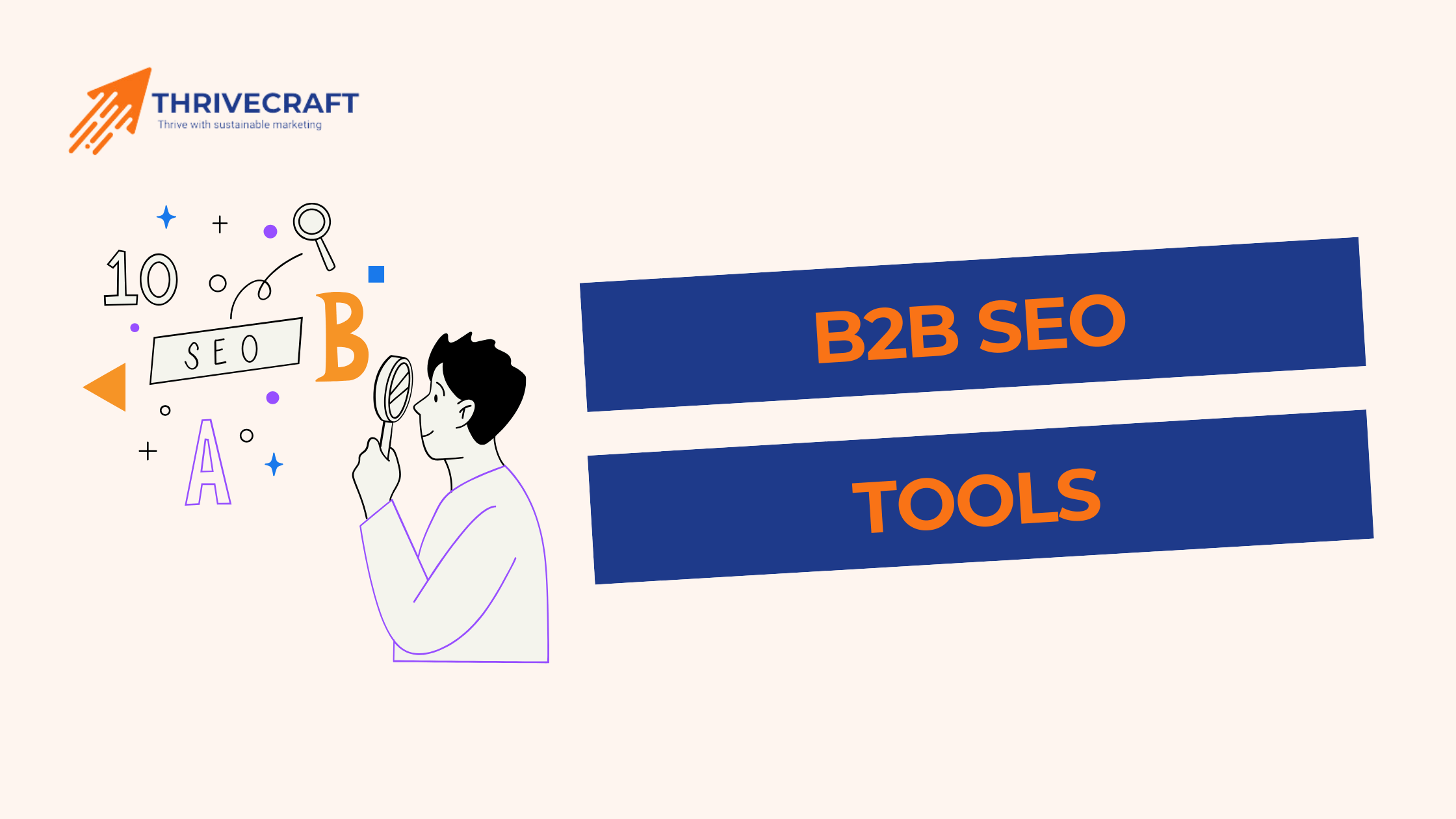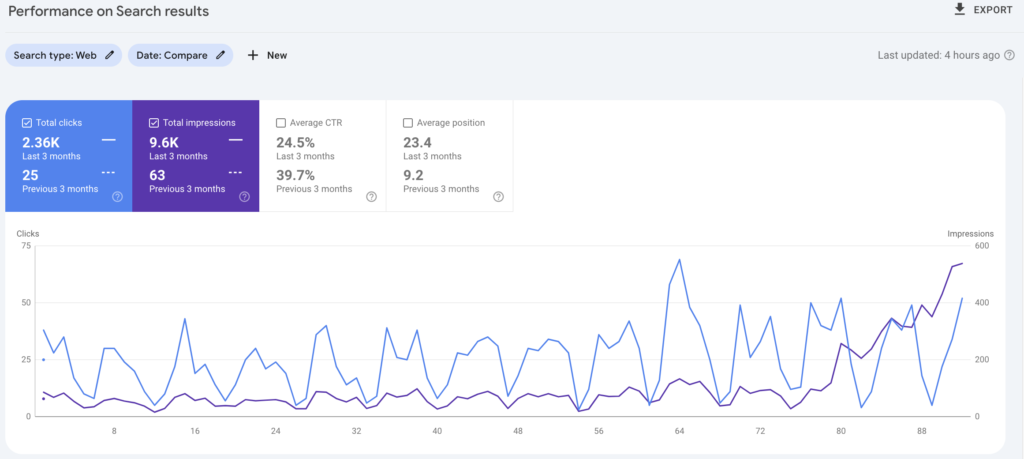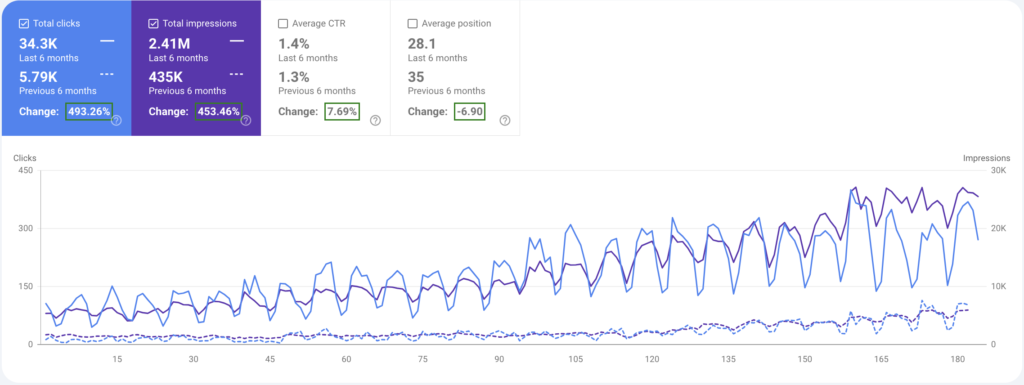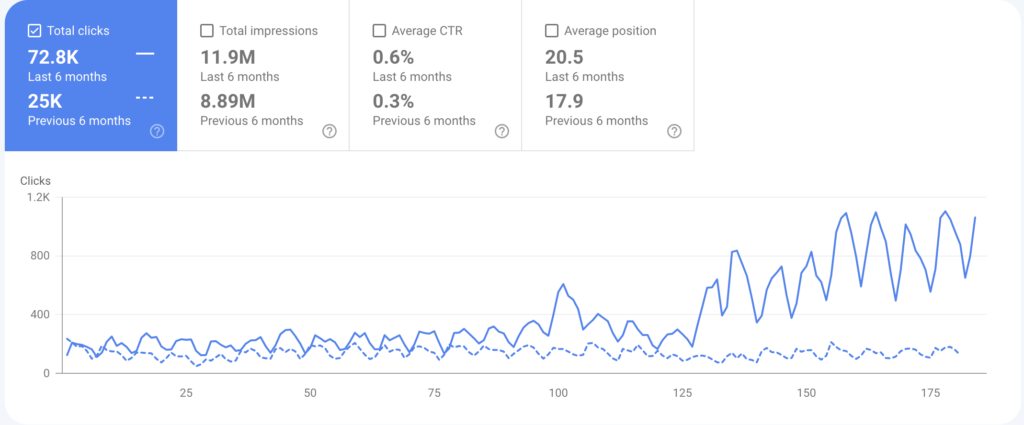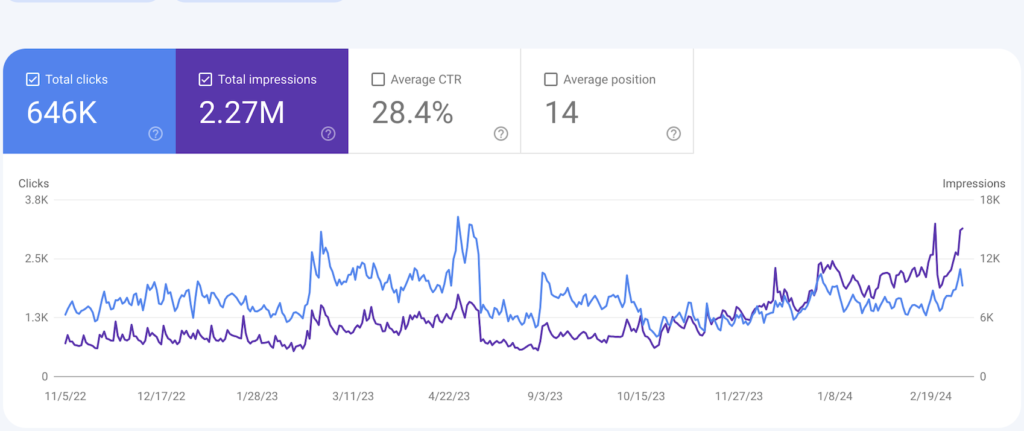B2B is an industry with long decision cycles and high competition. Becoming a top competitor is not possible without a solid SEO strategy. Unlike B2C brands that rely on impulse-driven purchases, B2B organizations take time to build trust, establish authority, and nurture leads.
This is where SEO tools come into play. They allow businesses to cut through the noise and reach a target audience precisely and efficiently. SEO is not only about ranking on Google—it means building traffic by bringing the right audience to it.
It is essential to optimize every stage for a great user experience to trigger long-term growth for the business. Good B2B SEO tools help discover high-intent keywords, analyze competitors, optimize technical SEO and backlink building to accelerate content creation by leveraging data-driven recommendations.
If you’re a startup looking for a budget-friendly option or a large enterprise needing to pull AI-driven automation, the right tools will change the game. B2B buyers do not decide overnight. They spend considerable time studying, comparing various alternatives, and looking for trusted sources within their respective fields.
68% of online experiences start with a search engine and B2B companies focusing on SEO. This generates 2X as much revenue as those who are not implementing SEO. But how can you gain DA and search ranking in a structured way?
At ThriveCraft, we help B2B brands gain better visibility in search results while driving organic traffic. We target high-intent prospects. We establish businesses as industry leaders via thought leadership content and decrease reliance on paid advertising to reduce customer acquisition costs.
In addition, let’s explore the best B2B SEO tools in different categories, such as keyword research, technical SEO, competitor analysis, content optimization, and analytics.
Let us help you build a scalable and high-performing SEO strategy.
TL;DR- B2B SEO Tools
In case you want to have a quick look at the tools discussed in the blog, here is the list:
1. Ahrefs
2. SEMrush
3. Google Keyword Planner (GKP)
4. Ubersuggest
5. Moz Pro
6. Majestic
7. SpyFu
8. SE Ranking
9. Screaming Frog
10. Sitebulb
11. Google Search Console
12. DeepCrawl
13. Surfer SEO
14. Clearscope
15. Frase
16. BrightLocal
17. Whitespark
18. Yext
19. Google Analytics 4 (GA4)
20. Google Data Studio (Looker Studio)
21. HubSpot SEO Analytics
22. SEOClarity
What is the Role of B2B SEO Tools?
Businesses use B2B SEO tools to enhance their online presence by boosting search engine rankings and generating leads. These tools help with keyword research, comparative analysis, backlink monitoring, and content optimization to reach their target audience as effectively as possible.
Why SEO is Crucial for Lead Generation?
SEO drives organic traffic, which makes it a crucial lead-generation strategy. High-ranking content instills consumer trust. It showcases the brand’s expertise and reliability. Good website optimization with white-label SEO increases visibility, enhances credentials, and converts visitors into leads without heavy paid ads.
The Impact of SEO on Brand Authority
A strong SEO strategy will help position a brand as an industry leader. High-ranking content builds trust with potential customers by increasing confidence and reliability. Regularly creating great content and earning backlinks from trusted sites, along with technical SEO optimization, creates long-lasting brand authority.
How B2B SEO Tools Streamline Optimization Efforts
B2B SEO tools automate and make many different aspects of SEO. It includes keyword searching, ranking analysis, and monitoring of competitors. SEO tools interpret what businesses need to do to optimize their strategies, minimize manual labor, and improve keyword rankings.
Key Features to Look for in B2B SEO Tools
The right B2B SEO tool enhances Google’s ranking and drives more organic traffic that generates leads. Here are some of the key features:
Advanced Keyword Research and Tracking
A strong B2B SEO tool always provides valuable keyword insights, which include:
- Competitor analysis, keyword difficulties, and search volume tracker.
- Keyword suggestions to target potential audience.
- It helps to monitor search engines’ ranking over time.
- Filters intent-based keywords for better and more effective targeting.
Competitor Analysis and Benchmarking
Competitor analysis is the key to refining SEO strategies. Select a tool with services such as:
- Competitor keyword analysis.
- Domain and backlink comparison.
- Insights into top-performing content.
- Real-time tracking of competitors’ ranking movements.
Technical SEO Audits and Site Health Monitoring
Technical SEO is crucial to delivering a smooth user experience. It includes steps that attract optimal search engine crawling. Features include:
- Proper website health checks help to remove broken links, duplicate content, and crawl errors.
- Page speed optimization suggestions.
- Mobile-friendliness and Core Web Vitals analysis.
- XML sitemap and robots.txt validation.
Backlink Analysis and Link-Building Assistance
High-quality backlinks are essential to improve domain authority, which helps increase search engines’ trust. A good B2B SEO tool should offer the following:
- A deep backlink profile analysis.
- Competitor backlink tracking for new opportunities.
- Link-building tools suggestions.
- Domain authority and trust score evaluation.
Content Optimization and On-Page SEO Recommendations
Content optimization is also essential for a website as it helps to connect directly with the audience. It includes features such as:
- Real-time SEO recommendations while drafting content.
- It helps to provide better readability, keyword density, and meta-tag analysis.
- Schema markup suggestions for rich snippets.
- Internal linking suggestions to improve page hierarchy.
Local SEO and Citation Management
For targeting specific regions, local SEO is vital. Essential functionalities include:
- Google My Business listing optimization.
- Citation tracking and NAP consistency checks.
- Local keyword ranking monitoring.
- Customer review management and response tracking.
Reporting, Analytics and Data Visualization
Some of the key features a tool must have:
- Personalization with real-time data.
- Ranking, traffic, and engagement reports.
- Integration with Google Analytics and Search Console.
- Automated report generation for stakeholders.
How B2B SEO Differs from B2C SEO
| Aspect | B2B SEO | B2C SEO |
| Target Audience | Focuses on decision-makers and business professionals | Concentrates only on individual consumers |
| Search Intent | Focuses on informational and transactional queries | Often includes commercial and transactional searches |
| Keyword Strategy | Long-tail, industry-specific keywords with lower search volume | Short-tail, high-traffic keywords targeting broad audiences |
| Content Strategy | In-depth guides, whitepapers, case studies, and reports | Product descriptions, blogs, videos and social media content |
| Sales Cycle | Multi-step decision-making process with stakeholders | Shorter buying cycle, often involving impulse purchases |
| Conversion Goal | Organic leads through form submissions, demo requests, or consultations | Direct sales, add-to-cart actions, and immediate purchases |
| Backlink Strategy | Building authority through guest posts and partnerships | Broad outreach to influencer collaborations and PR |
| SEO Metrics | Focuses on lead quality, organic traffic, engagement, and conversion rates | Prioritizes traffic volume, click-through rates, and sales conversions |
| Local SEO Focus | Important for niche markets and location-based services | Essential for physical stores, restaurants, and local services |
| Technical SEO | Requires detailed site architecture, schema markup, and structured data | Emphasizes page speed, mobile optimization, and user experience |
Key Takeaways
B2B SEO prioritizes only lead generation, industry expertise, and high-value content to provide longer customer relationships.
B2C SEO focuses only on direct-to-consumer sales and high engagement for quick conversion.
Key Challenges in B2B SEO
Here are some key challenges that require a strategic approach to blend technical optimization, high-quality content, and data-driven decisions.
| Challenge | Description |
| Longer Sales Cycles | B2B decision-making involves multiple stakeholders to lead longer sales funnels without delaying conversions. |
| Niche & Low-Volume Keywords | B2B keywords tend to have lower search volumes to attract potential organic traffic. |
| Content Complexity | B2B content must be highly informative, technical, and tailored to different decision-makers. |
| Competitive Market | It is challenging for new businesses to rank higher in the established brands market. |
| Lead Quality Over Quantity | Unlike B2C, where high traffic often equals more sales, B2B SEO must attract the right audience, not just more visitors. |
| Backlink Acquisition | Getting backlinks from authoritative industry sources is more complex than B2C. |
| SEO & Sales Team Alignment | B2B SEO strategies must align with sales teams to ensure keyword targeting and content drive relevant leads. |
| Technical SEO Complexity | B2B websites often have complex architectures, multiple landing pages, and gated content. |
| Local vs. Global SEO Balance | Many B2B companies serve local and global markets, requiring a well-balanced SEO approach for different regions. |
| Measuring ROI | Proving SEO ROI in B2B is tricky since leads take longer to convert, requiring advanced analytics. |
Top B2B SEO Tools for Keyword Research
Here are the detailed uses of the industry’s best B2B SEO tools. Let’s understand their uses:
Ahrefs: Best Features for B2B Keyword Research
Ahrefs is one of the popular tools for B2B keyword research. The features include:
- Keyword Explorer: Provides search volume, keyword difficulty, and CPC insights.
- Parent Topic Analysis: Groups-related keywords to help target a broader audience.
- Click Metrics: Determines actual clicks per search to help prioritize high-intent keywords.
- SERP Analysis: Studies top-ranking pages to assess competition and ranking potential.
How to Find Competitor Keywords Using Ahrefs
- Site Explorer: The domain of a competitor is entered to analyze their top organic keywords.
- Content Gap Tool: Compare your site with competitors and check missing keyword opportunities.
- Top Pages Report: Find which competitors’ pages drive the most traffic and their keyword strategy.
- Paid Keywords: Identify what keywords competitors target in paid search to fine-tune organic approaches.
SEMrush: Keyword Gap Analysis for B2B Marketing
The Keyword Gap Tool in SEMrush allows B2B marketers to:
- Compare keywords for multiple competitors’ strategies.
- Identify untapped keywords that competitors rank for but your business does not.
- Discover shared keywords to improve ranking against direct competitors.
- Export keyword lists for content optimization and PPC campaigns.
PPC vs. Organic Keyword Insights
- Organic Keyword Report: Generates a list of top-ranking keywords, search volume, and difficulty.
- Advertising Research: Lists paid keywords competitors are bidding on.
- CPC and Competitive Density: This will help prioritize keywords for SEO vs. PPC based on cost and competition.
- Ad Copy Analysis: It reveals competitor PPC ad strategies that can offer content ideas.
Google Keyword Planner (GKP)
Here’s how you can leverage B2B content strategy with the help of the Google Keyword Planner tool.
- Broad Match Vs. Exact Match Keywords: For a refined approach to keyword selection for intent-based targeting.
- Industry-Specific Keyword Suggestions: To find long-tail B2B queries.
- Forecasting Tool: For strategic planning with estimated traffic and competition levels.
- Regional Targeting: To help optimize content to a more specific geographic market.
Understanding the Search Intent in B2B SEO
- Informational: “What is cloud cost optimization?” Great content for blogs and guides.
- Navigational: “Ahrefs vs. SEMrush.” Comparisons of pages or product-specific content.
- Transactional: “Buy enterprise SEO software.” Meaningful landing pages with CTAs.
- Commercial Investigation: “Best B2B marketing automation tools.” Listicles and whitepapers.
Ubersuggest
Ubersuggest is a budget-friendly alternative for keyword research for startups. It offers:
- Keyword Ideas Tool: Generates the variations, associated terms, and long-tail keyword suggestions.
- Search Volume and CPC: It provides data to prioritize keywords in a budget-friendly manner.
- SEO Difficulty Score: This tool also assesses the levels of competition for organic rankings’ feasibility.
- Content Ideas: Shows the highest-performing pages for targeted keywords.
Finding Long-Tail B2B Keywords with Ubersuggest
- Enter a broad industry keyword like “cloud security”.
- With the “Related Keywords,” discover specific queries, such as “cloud security for fintech”.
- Check “Questions” and “Comparisons” for conversational keyword opportunities.
- Filter through low SEO difficulty and moderate search volume for realistic chances to rank.
Best Tools for Competitive Analysis and Backlink Research
Here is the detailed use of the industry’s best competitive analysis and backlinking tools. Let’s understand their uses:
Moz Pro
Moz Pro features for domain authority tracking and analysis of backlinks include:
- Domain Authority (DA) Score: Most generally used for measuring a site’s strength by the quality of backlinks.
- Link Explorer: This shows all the inward links and their quality with a spam score in case of malware or other measurements.
- Spam Score Analysis: Represents spam or low-quality backlinks that are likely to hurt rankings.
- Lost and New Links Tracking: Monitored changes on contextual linking and keeps records.
How to Identify New Link-building Opportunities
- Use Link Intersect to compare the domain connections of maximum competitive sites to find prospective backlinks.
- Search for high DA sites that target discount business blogs in the industry.
- Find mentions without contacting webmasters who made references to your business.
- Utilize backlink opportunities through replica gathering of cited page sites for competitors’ domains.
Majestic
Majestic’s two specific major parameters while rating the quality of links for which trust flow stands:
- TF: Trust flow measures the quality and authority of the incoming links. The higher the trust flow, the better the quality.
- CF: The citation flow works on the quantity of the links, not on the quality of the link.
- The Topical Trust Flow: The topical trust score categorizes the incoming links based on their relevancy to the industrialist.
Understand Link Profiles in B2B SEO
A high TF and low CF suggest high-quality backlinks are used from authoritative sites. A low TF with high CF suggests spammy or irrelevant backlinks are used. Therefore, always use reliable SEO service providers to achieve high trust flow linking to their business models, creating a business-validating reputation.
SpyFu: Track Competitors’ PPC and SEO Strategies
SpyFu provides in-depth data about what competitors do in marketing, for example:
- Competitor PPC Spend Analysis: Find out what your rival spends on Google Ads.
- Top-Ranking Organic Keywords: Uncover the keywords that drive traffic to their sites.
- Ad History: Look at past and current PPC campaigns for inspiration.
- Keyword Overlap Reports: Compare keyword strategy gaps between your site and competitors.
Uncover Hidden Keyword Opportunities
- Discover High-ROI Keywords: These are the keywords that competitors are targeting mostly.
- Analyze Paid vs. Organic Keywords: Discover which organic keyword your competitors are bidding on.
- Reverse Engineer Competitor SEO Strategy: You can do this by optimizing your content on their keywords.
SE Ranking: Monitor Keyword Positions of Competitors
SE Ranking enables tracking and benchmarking of keyword rankings in real-time in the following ways:
- Competitor Keyword Tracking: To find out how your rankings hold up against your competitors.
- Local & Global Rank Tracking: This is extremely valuable for B2B companies targeting multiple regions.
- Historical Data & Features: Track the changes in position and chart the trends set by Google SERP.
Track Backlinks and Domain Strength
- Backlink Checker: It helps to monitor your gained/lost backlinks and overall domain strength.
- Toxic Link Analysis: Get helpful hints about backlink removal processes so that you do not get any penalties from Google.
- Backlink Gap Tool: It helps identify domains that link to your competitors.
Technical SEO and Site Audit Tools
Let’s break down the best technical SEO and site audit tools.
Screaming Frog: Crawl large B2B websites for SEO issues
Screaming Frog is a powerful crawler application based on the desktop, which inspects websites for SEO problems as these:
- Broken Links & Redirects: Finds 404 errors and faulty redirects.
- Duplicate Content & Thin Pages: Identifies identical titles, duplicate meta descriptions, and low-content pages.
- XML Sitemap & Robots.txt Analysis: Verifies whether the right indexing and crawling directives are used.
- Page Speed & Core Web Vitals Insights: This shows slow-loading pages that are eligible for optimization.
Identify Broken Links and Duplicate Content
- Crawl your website to detect technical issues affecting performance.
- Find and fix broken internal & external links for a better experience and SEO.
- Analyses metadata to ensure all pages have unique optimized metatags.
- HTTP Vs. HTTPS Pages check to avoid security-related SEO Penalties.
Sitebulb: Advanced Audit Reports and Visualization
Sitebulb goes further beyond traditional crawling. It offers:
- Comprehensive SEO Scorecards: A breakdown of website issues with priority.
- Core Web Vitals Examination: Measures Largest Contentful Paint (LCP), First Input Delay (FID), and Cumulative Layout Shift (CLS).
- Interactive Data Visualization: This highlights crawl depth issues, internal linking issues, and orphaned pages.
- Structured Data And Schema Checks: These guarantees are implemented well for rich results.
How to Optimize B2B Sites for Core Web Vitals
- Identify Slow Pages: Find the problem pages with high LCP, FID, and CLS issues.
- Optimize Image & Video Loading: Use the latest formats for lazy loading.
- Minimize Render-blocking Resources: Reduce blocking resources via JavaScript and CSS.
- Improve Server Response Times: Speed is achieved by caching, and CDN allows quick loading.
Google Search Console: Key Reports Every B2B Marketer Should Use
Google Search Console delivers direct feedback from Google to observe and enhance the website’s performance. It provides:
- Performance Report: Utilizes organic traffic tracking, impressions, clicks, and CTR.
- Coverage Report: Allows you to determine indexed versus non-indexed pages.
- Mobile Usability Report: Identifies mobile SEO issues.
- Core Web Vitals Report: Provides insights into the metrics of pages for ranking improvements.
Fix Indexing and Crawling Errors
- Find “Excluded” pages from the Index Coverage Report and fix their issues. For example, “Crawled-currently not indexed”.
- Submit XML Sitemaps to guide Google on which pages should be indexed.
- Inspect indexing errors with the URL Inspection Tool and request re-indexing if necessary.
- Fix mobile usability errors to ensure mobile experiences are friendly.
DeepCraw: How to Analyze Large Websites for Technical SEO
DeepCrawl is a cloud-based tool for robust site audits. It is ideal for large B2B sites with complex site structures.
- JavaScript Rendering Analysis: This helps identify SEO problems with JavaScript-based websites.
- Mobile and Desktop SEO Comparisons: This ensures a seamless experience across devices.
- Internal Link Structure Optimization: This helps improve link equity distribution.
- Log File Analysis: Investigation into how search engines crawl the site.
Identify Mobile and Desktop SEO Issues
- Run a complete crawl to check for discrepancies between mobile and desktop versions.
- Check for Mobile-First Indexing compliance to ensure mobile pages match desktop content.
- Fix Page Load Speed Issues using Core Web Vitals recommendations.
- Analyze Internal Links to improve routing and distribution of page authority.
On-Page SEO and Content Optimization Tools
Let’s discuss On-page SEO and content optimization tools.
Surfer SEO: AI-powered Content Recommendations
Surfer SEO examines top-ranking pages and gives live content recommendations to develop on-page SEO. Key features are:
- Content Score & Optimization Suggestions: Compare your content with that of the competitors.
- Keyword Density & NLP Analysis: Keep decent keyword usage.
- SERP Analyzer: Points to target keyword-specific ranking factors.
- Internal Linking Suggestions: Enhance the site architecture and SEO.
How to Optimize B2B Blog Posts for Rankings
Tips to promote B2B blog posts using strategies to outrank competitors.
- Start with Surfer’s Content Editor to get AI-assisted keyword and content layout suggestions.
- Optimize the number of words, headings, and images corresponding to the other pages that perform exceptionally well.
- Insert the terms recommended by NLP strategists to enhance content relevance.
- Structure the internal links in the way Surfer suggested to boost page authority.
Clearscope: Semantic Keyword Optimization for Content
Clearscope reviews the best keywords and most related topics. The Key Features:
- Grading System: Content is graded based on how well it uses keywords and addresses relevant topics.
- Competitive Analysis: Your content is compared to information on well-rated websites.
- Search Intent Insights: Content would be aligned to user intent.
- Google Docs and WordPress Integration: you can align your content with internal processes.
How to Create Data-driven Content Briefs
- Enter a target keyword to generate a list of essential terms and related topics.
- Use the Content Grade System to ensure optimal coverage of key terms.
- Analyze top competitors’ content to structure your article effectively.
- Incorporate high-impact terms in headings, body content, and meta descriptions.
Frase: How AI Enhances B2B Content Marketing
Frase helps B2B marketers streamline content creation by using AI for:
- Automated Content Briefs: Generates outlines based on competitor content.
- Topic Research & Idea Generation: Find trending topics under your niche.
- AI-Powered Writing Assistant: It helps refine and improve content quality.
- Answer Engine Optimization: It optimizes content for featured snippets and voice searches.
Generate Topic Ideas for High-ranking Content
- Use Frase’s Topic Research Tool to find relevant, high-volume search queries.
- Analyze competitor content to identify gaps and opportunities.
- Create AI-generated outlines based on top-ranking pages.
- Optimize for featured snippets by structuring content with FAQs and concise answers.
Local SEO Tools for B2B Companies
Here’s a deep insight into Local SEO tools.
BrightLocal: Manage Google Business Profile for B2B Brands
BrightLocal is an innovative software tool dedicated to local SEO for B2B-specific businesses that aid in optimizing their Google Business Profile (GBP). It tracks and follows up on local search performance. Key features are:
- GBP Management: Edit the business’ data, reply to customers’ reviews, and optimize GBP listings.
- Local Rank Tracking: Monitor positions in search results for several locations.
- Citation Tracking & Cleanup: Find wrong or missing citations in directories.
- Competitor Analysis: Determine how well your local SEO does compared to competitors.
Track Local Search Rankings and Citations
- To Claim & Optimize GBP: Ensure completed details, categories, and business descriptions.
- Track Local Keyword Rankings: Monitor how well your business ranks in local searches.
- Fix Inconsistent Citations: Use BrightLocal’s citation tracker to fix business listings.
- Inspire Customer Reviews: Monitor and respond to reviews to enhance credibility.
Whitespark: Find and Manage Business Citations
Whitespark is the expert in local citation building and reputation management for businesses that target hyper-local regions.
- Citation Finder: It helps to find business directories in which competitors are listed.
- Reputation Builder: Manage review generation and management.
- Local Rank Tracker: Offers in-depth reports about local SEO performance.
- GBP Audit: Ensure the GBP is thoroughly optimized for local ranking purposes.
Improve Local SEO for B2B Service Providers
- Find Citation Opportunities: Get your business listed on authoritative directories.
- Monitor Business Listings: Ensure NAP (Name, Address, Phone Number) is accurate and consistent.
- Ensure Local Landing Page Optimization: Match location-specific content with search intent.
Yext: Manage Online Reputation and Business Listings
Yext is a business listing and reputation management platform that ensures consistent branding across all online directories.
- Business Listings Management: It syncs your company details across 200+ directories.
- Review Monitoring & Response: It tracks and responds to customer feedback.
- AI-Powered Answers: It helps to enhance search visibility with structured data and FAQs.
- Schema Markup Integration: Improves search engines’ understanding of your business.
How Structured Data Improves Local SEO
Structured data (Schema Markup) helps search engines understand business details by improving local search rankings. Key benefits include:
- Enhanced Google Business Profile Visibility: Rich snippets show contact details, services, and FAQs.
- Better Local Pack Rankings: Increases chances of appearing in the Google 3-Pack.
- Voice Search Optimization: Makes business details easily accessible for voice assistants like Siri and Alexa.
- Increased Click-Through Rates (CTR): Rich results provide direct answers, boosting engagement.
Reporting and Analytics Tools for B2B SEO
These are the four most reliable reporting and analytics tools for B2B SEO.
Google Analytics 4: Setting Up GA4 for B2B Lead Tracking
Google Analytics 4 provides advanced user behavior tracking and AI-driven insights for better SEO decision-making. Key Features include:
- Event-Based Tracking: It measures SEO actions such as form submissions and demo requests.
- Funnel & Conversion Path Analysis: It helps visualize how leads interact with content before converting.
- Cross-Device & Cross-Platform Tracking: Monitors B2B customer experience across multiple platforms.
- AI-Powered Predictive Metrics: Helpful in forecasting potential conversions based on user behavior.
Analyzing Website Traffic and Conversion Paths
- Define Key Events: Helpful in tracking form submissions, whitepaper, and chatbot conversations.
- Enable Enhanced Measurement: You can automate tracking of clicks, scrolls, and video engagement.
- Use Custom Reports: Create dashboards that display organic traffic performance, user engagement, and lead conversions.
- Integrate with Google Search Console: Provide analytics on keyword rankings alongside website traffic.
Google Data Studio: Creating Automated SEO Reports
Google Data Studio (Looker Studio) allows teams to visualize SEO data from GA4 and Google Search Console. The best features are:
- Customizable Dashboards: This combines multiple data sources in a single format.
- Automated Data Updates: This ensures real-time automated reporting.
- SEO Templates for B2B Teams: It provides Pre-built reports for traffic, keyword rankings, and conversion insights.
- Interactive Data Filters: This allows users to analyze performance by traffic source, landing page, or campaign.
Best Dashboard Templates for B2B Teams
| Template Name | Use Case |
| SEO Performance Report | Tracks keyword rankings, organic traffic, and conversions. |
| Content Engagement Report | Analyzes blog performance, bounce rates, and time on page. |
| Lead Generation Funnel | Visualizes the customer journey from organic search to conversion. |
HubSpot SEO Analytics: Integrating SEO with Marketing Automation
HubSpot’s SEO analytics tool integrates with CRM and marketing automation. This tool is very beneficial for B2B lead generation. Some of the key aspects are:
- SEO and Content Strategy Alignment: It detects content gaps according to search trends.
- SEO Suggestions: It provides On-page optimization recommendations.
- Lead Attribution Reporting: Compares which organic keywords produced the highest conversions.
- Automated Workflows: Link SEO insights to email and lead nurturing campaigns.
How to Measure Content Performance
- Use SEO Topic Cluster Tool: Group content around core themes to improve authority.
- Organic Traffic Per Post: Identify which content is performing well for repurposing.
- Measure Lead Conversions via SEO: Link search queries together that led the user to the site and submitted forms.
- Content-driven Revenue: Understand which SEO deliverables contribute to sales.
SEOClarity: AI-driven SEO Insights for Enterprise B2B Companies
SEOClarity uses AI-powered insights to automate SEO task loads and track competitors for big B2B companies. Best Features are:
- Real-Time Keyword Rank Tracking: Tracks rankings for thousands of B2B keywords.
- AI-Generated Insights for SEO: Automating the work of optimizing the content and helping in the analysis of keywords.
- Competitors Tracking: Determines keyword gaps and backlink possibilities.
- Predictive Analysis: Estimates the effect of SEO on keywords according to the behavior shown in historical data.
Automating Keyword Tracking and Competitor Monitoring
- Setting Up The Alerts: Get notified when rankings change significantly.
- AI-Driven Content Optimization: Enhance content through the methods of automated SEO suggestions.
- Competitor Keyword Performance Analysis: Identifies keywords on which your competitors are outranking you.
- Use SEO Forecasting: Anticipate which optimizations will generate the most growth.
All-in-One SEO Platforms for B2B Businesses
B2B SEO requires a multi-layered approach that includes keyword research, competitor analysis, technical audits, and link-building. All-in-one SEO platforms like SEMrush and Ahrefs offer comprehensive toolkits for creating better strategies.
Semrush: How to Use Semrush for a Full-funnel SEO Strategy
SEMrush is a powerful SEO tool integrating keyword research, competitor analysis, content marketing, and link-building into a single platform.
| SEO Funnel Stage | SEMrush Features & Tactics |
| Awareness of Top of Funnel – TOFU | Keyword Magic Tool: Find high-volume B2B keywords. Topic Research Tool: Generate blog & content ideas. |
| Consideration of Middle of Funnel – MOFU | Keyword Gap Analysis: Compare keyword opportunities with competitors. SEO Content Template: Get AI-driven recommendations for optimizing content. |
| Decision of Bottom of Funnel – BOFU | Backlink Analytics: Find link-building prospects.Site Audit Tool: Fix technical SEO issues before conversion. |
Combining Keyword Research, Site Audit, and Link-building
Start with Keyword Research: Analyze search volume, CPC, and competition to identify long-tail B2B keywords with the Keyword Magic Tool.
Run a Comprehensive Site Audit: Detect broken links, duplicate content, and crawl errors by content audit using the SEO Ideas Tool to get page-specific optimization recommendations.
Build a Strong Backlink Profile: Use Backlink Analytics to analyze competitors’ link-building strategies. This helps to identify high-authority sites for guest posting.
Ahrefs: How Ahrefs Serves as a Complete SEO Solution
Ahrefs is a tool known for robust backlink analysis, keyword research, and rank tracking. Ahrefs features are:
| SEO Component | Ahrefs Features |
| Keyword Research | Keywords Explorer: Discover global & country-specific B2B keywords. Parent Topic Feature: Group keywords under a broader theme. |
| Technical SEO | Site Audit: Detect crawling, indexing, and Core Web Vitals issues. |
| Competitor Research | Site Explorer: Analyze competitor traffic sources & top-performing content. Content Gap Tool: Identify keyword opportunities for which your competitors rank. |
| Backlink Strategy | Backlink Checker: Find high-quality link-building prospects. Broken Link Finder: Identify & reclaim lost backlinks. |
Using Ahrefs for Organic and Paid Search Insights
Track Organic Keyword Rankings: Use Rank Tracker to monitor keyword positions across multiple search engines.
Analyze Competitor PPC Strategies: Check the Paid Keywords Report to see which keywords competitors bid on. This will identify high-converting paid keywords for potential organic content targeting.
How to Choose the Right B2B SEO Tools for Your Business
The best B2B SEO tools depend on the business size, budget, and goals. Let’s understand the requirements of different businesses.
Matching Tools to Your Business Size and Budget
| Business Size | Recommended SEO Tools | Why These Tools? |
| Small Businesses & Startups | Ubersuggest, Google Search Console, Google Keyword Planner | Budget-friendly, beginner-friendly SEO insights. |
| Mid-Sized Companies | SE Ranking, SEMrush, Moz Pro | Balance of affordability & advanced features for competitive analysis. |
| Enterprise B2B Companies | Ahrefs, SEOClarity, DeepCrawl | Scalable SEO solutions with AI-driven automation & in-depth analytics. |
Evaluating Free vs. Paid Seo Tools
| Feature | Free SEO Tools | Paid SEO Tools |
| Keyword Research | Google Keyword Planner, Ubersuggest | SEMrush, Ahrefs, Moz Pro |
| Competitor Analysis | Google Search Console | SEMrush, SpyFu, Ahrefs |
| Backlink Analysis | Google Search Console (limited) | Ahrefs, Majestic, Moz Pro |
| Technical SEO Audits | Google Search Console, Screaming Frog (free version) | DeepCrawl, Sitebulb, SEMrush |
| Local SEO | Google Business Profile, BrightLocal (free version) | BrightLocal (premium), Yext, Whitespark |
| Reporting & Analytics | Google Analytics 4, Google Data Studio | SEOClarity, HubSpot SEO Analytics |
Best Tool Combinations for Different B2b Needs
For Startups & Small Businesses
- Google Search Console – Track indexing & performance.
- Google Keyword Planner – Find B2B keyword opportunities.
- Ubersuggest – Affordable keyword & competitor analysis.
- Screaming Frog (free version) – Basic site audits & technical fixes.
For Mid-Sized B2B Companies
- SEMrush – All-in-one SEO solution with competitor tracking.
- Moz Pro – Strong domain authority tracking & link-building.
- BrightLocal – Manage local SEO & citations.
- SE Ranking – Monitor keyword rankings & backlinks.
For Large B2B Enterprises
- Ahrefs – Best for deep backlink & competitor analysis.
- SEOClarity – AI-powered SEO & enterprise reporting.
- DeepCrawl – Large-scale technical audits & Core Web Vitals optimization.
- Google Data Studio – Custom SEO dashboards & marketing automation.
Conclusion
An excellent SEO strategy is vital in attracting the right audience, generating good leads, and creating long-lasting brand authority. But without the right tools, any effective search engine optimization can be quite time-consuming with less results.
Businesses cut down on effort by using B2B SEO tools for keyword research, competitor analysis, technical audits, backlink tracking, and performance monitoring. These tools make you capable of making decisions based on data that leaves you ahead of the competition.
But using these tools effectively is a prerequisite, whether you’re a startup looking for budget solutions or an enterprise searching for AI-powered insights.
With the right SEO tools, ThriveCraft can help you scale your digital presence and maximize your ROI. We help businesses drive potential traffic using the proper strategic tools in less time and create thoughtful leadership content to drive organic traffic without excessive cost.
Bring your queries to us, and we’ll help you thrive in a competitive market.
Ready to scale your B2B SEO strategy? Look for tools that support your goals, and let your organic growth take flight!
Frequently Asked Questions (FAQs):
What Is the Difference Between B2B and B2C SEO Tools?
B2B content marketing is usually directed towards highly specialized niche audiences, while B2C focuses more on people who may not have a detailed technical vocabulary to describe what they’re looking for.
How Often Should B2B Companies Perform SEO Audits?
A comprehensive audit is advised annually, with more frequent audits, including quarterly, monthly, or weekly SEO audits, for dynamic or competitive industries.
Which SEO Tool Is Best for Small B2B Businesses?
For small B2B businesses, a combination of free and paid SEO tools, such as Google Analytics, Google Search Console, and Google Keyword Planner, is recommended.
Are Free SEO Tools Effective for B2B Marketing?
Yes, free SEO tools can be effective for B2B marketing, especially for initial keyword research, website audits, and fundamental performance analysis.
What Are the Best SEO Tools for Startups and Agencies?
For startups and agencies, a combination of free and paid SEO tools is recommended, with Google Search Console and Google Analytics as free essentials.

